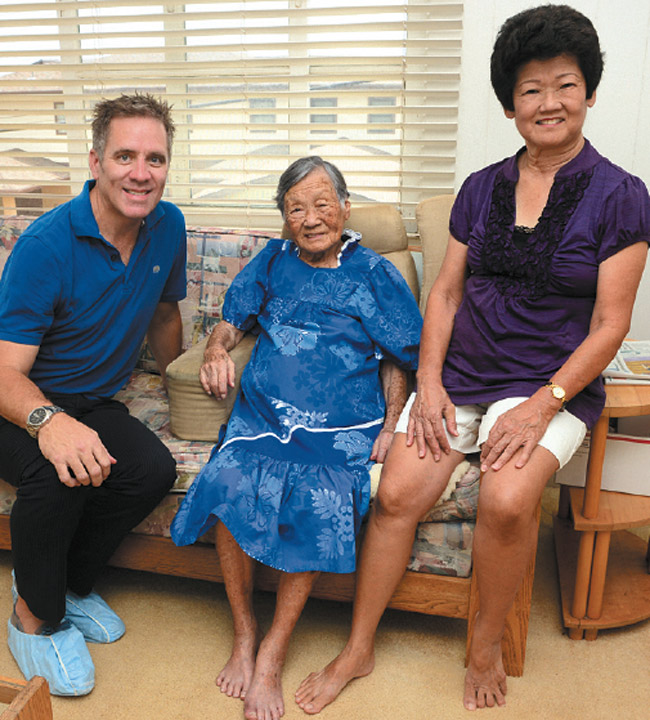House Calls For Dementia Patients
Have you ever walked into a room and forgotten why you’re there, called 4-1-1 and it slips your mind whose number you’re supposed to ask for? How about washing your hair with toothpaste or placing milk in the cabinet under the sink? That latter type of short-term memory loss is more serious than you think. If you’re over age 60 and you or someone you know is battling dementia ─ to the point where the illness is starting to impair daily functions ─ it’s time to call on someone like the Dementia House Doctor. Some people confuse Alzheimer’s disease with dementia, but there is a difference. Alzheimer’s is a disease and dementia is mostly caused by Alzheimer’s and is a group of symptoms that include loss of memory, thinking and reasoning skills. While the majority of people with Alzheimer’s are 65 and older, up to 5 percent of people with the disease have early onset Alzheimer’s, which can appear when someone is in their 40s or 50s.
“As we get older, we begin to lose brain cells and sometimes our memory starts to deteriorate,” explains dementia and Alzheimer’s expert Dr. Bret Flynn regarding the irreversible, progressive brain disease that slowly hinders an elderly individual from carrying out the simplest tasks. Flynn is medical director for the house call program at The Queen’s Medical Center. I first met Dr. Flynn on a flight to Kauai while he was en route to a dementia clinic he runs at the Kuhio Medical Plaza in Lihue, a joint venture between Queen’s and the Alzheimer’s Association, Aloha Chapter.
Flynn visits frail patients in the comfort of their own living rooms, most of whom are battling advanced dementia or Alzheimer’s. “One patient was so paranoid that she had not seen a doctor for 10 years. I have to be creative when I enter their homes so I can help these people,” he said. “I visited a lady last week who is terrified of physicians. We chatted and when she found out that I was a doctor, she freaked, so the family asked that I pretend to be a grandson.” Once Flynn did, the dementia patient was fully cooperative. “I’m going to college, Grandma, so hope you don’t mind if I practice on you to take your blood pressure,” said Flynn gently as he examined the elderly patient. When the good doctor started to ask questions, the elderly woman became suspicious.
The warning signs of dementia are: repetition of stories, language problems, personality changes, dis-orientation and confusion, lack of hygiene and odd behavior. Many primary care physicians who diagnose their patients with dementia or Alzheimer’s refer their clients to specialists – typically neurologists or physicians in geriatric medicine-like, Flynn. “There have been a couple of cases where the patients were diagnosed with dementia but after further testing, they didn’t have the illness, they had more problems than expected.” If a family member needs someone to help delineate problem solving, they see Flynn. “I am able to give them more of my time. I spend 1.5 hours per patient, most of whom are referrals from their primary care physicians,” he said.
“There are medications that can address and slow down the affects of Alzheimer’s. Early diagnosis also assists in differentiating between Alzheimer’s ans other diseases or illnesses resulting in dementia,” said Pamela Yuen of the local Alzheimer’s Association. Those battling dementia are paranoid but certain medication can change lives. “Once the meds start kicking in, in most cases, they get more receptive to doctors coming in and examining them.”
One of the biggest problems of dementia is that some people get meaner and agitated as they age. Flynn was part of a study in Honolulu involving a drug called Aripiprazole aimed at helping those elderly who are psychotic or display behavioral features. In recruiting patients to enroll in the 2001 study, one lady was particularly difficult and extremely uncooperative, recalls Flynn. But once the patient started taking the drug, “She rubbed my face and told me I had the most beautiful eyes.” Sometimes anti-psychotic drugs can have an opposite effect, where patients transform from being hostile to being accommodating.
The challenge is that there are numerous elders in our state who have not gotten any kind of care at all, not until they hit a crisis and end up in the emergency room. Some have no family members to keep an eye on them, others are on the edge where they shed weight and their refrigerator has a lot of bad moldy food. “It’s a major crisis, because if they don’t have family, there are not a lot of options for them, unless they have enough financial resources to pay for private care, assisted living, nursing home or care home,” said Flynn.
This is where the Alzheimer’s Association comes into the picture. “We offer counseling and other resources for the caregiver. We teach them how to take proper care of themselves, how to reduce their own anxiety and how to find respite,” said Yuen. The Association’s Five Core Program includes: Information and Referral, Educational Classes, Support Groups, Care Consultation and Medic Alert, and Safe Returns, involving ID bracelets. Their number is 591-2771.
Other agencies such as the St. Francis Home Care Services can come in to help with bathing, and Meals on Wheels assists seniors who have a difficult time obtaining groceries.
Dr. Flynn believes baby boomers can expect a “Silver Tsunami” on the horizon. A tsunami where a large group of our population living out their golden years, will include a huge wave of dementia patients, some of whom may be our dearest friends and loved ones.






